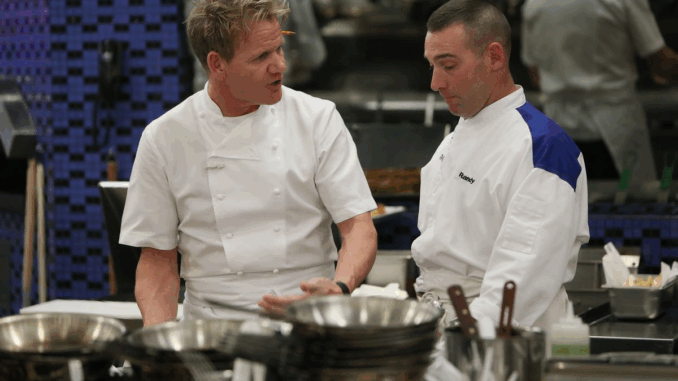
For decades, Gordon Ramsay has commanded kitchens with an iron fist, his fiery persona a fixture on screens worldwide. Yet behind the swagger and culinary conquests lies a scandal so unnerving that it nearly brought down one of television’s biggest empires. This is the untold story of the covert surveillance operation that forced Ramsay’s team to question everything—and nearly ended his reign.
The Spark of Suspicion
It all began during a period of rapid expansion. Ramsay’s empire was growing—new restaurants, new shows, and a brand that resonated with millions. But whispers within the production team hinted at something more sinister. A few trusted insiders began noticing anomalies: private conversations being interrupted, confidential emails mysteriously disappearing, and secret meetings that left certain crew members anxious and paranoid.
Rumors circulated that someone within the inner circle was leaking sensitive information to rival networks. Rather than confront the issue openly, Ramsay, known for his unyielding drive to protect his legacy, took drastic action. He authorized a covert investigation to unmask the traitor, hiring an investigator to probe deep into the digital communications of his trusted team members.
The Operation That Shook the Kitchen
Under the guise of ensuring quality control and safeguarding creative integrity, the investigation quietly escalated. Private detectives were sent to monitor phone calls, scrutinize emails, and even record offhand remarks made in the backstage corridors of production studios. The operation, shrouded in secrecy, was meant to be a safeguard for Ramsay’s brand. However, when details began to leak, the fallout was immediate.
A handful of production staff, upon discovering that their communications were being surveilled, felt betrayed. They had trusted Ramsay implicitly; the idea that someone was watching them—even at the behest of their idol—shattered that trust. Accusations began to emerge, with former employees alleging that the surveillance was not just an invasion of privacy, but a tool used to manipulate and control every aspect of the creative process.
One anonymous crew member lamented, “We thought we were in a family, but instead, we were being treated like criminals.” The scandal was the kind that media outlets relished: a celebrated chef turned secret spy, a kitchen once full of camaraderie now clouded by suspicion and betrayal.
The Impact on the Shows
The repercussions were swift and severe. Ratings for a few key programs noticeably dipped as fans began to wonder if the authenticity they’d come to admire was compromised. Kitchen Nightmares and Hell’s Kitchen—once symbols of unfiltered passion and raw emotion—were now under a shadow. Critics argued that the staged surreptitious recordings and orchestrated confrontations robbed the shows of their spontaneity.

Sponsorship deals were put on hold, and internal morale plummeted. Long-time collaborators left quietly, their departures barely acknowledged by the media, yet leaving behind a void filled with questions. The once tight-knit team at Ramsay’s production company found itself divided, with loyalty replaced by a lingering sense of betrayal.
Ramsay’s Response and a Shaken Legacy
In a public statement, Ramsay defended his actions. “In business, sometimes you have to protect your vision, even if it means making hard choices,” he asserted. Yet, for many, these words rang hollow. The chef who had built an empire on passion and transparency was now embroiled in allegations of paranoia and oppression.
While the surveillance scandal eventually subsided into whispered boardroom discussions and muted apologies, its legacy endures. Ramsay’s empire survived the storm, but not without scars. New protective measures were implemented, and a culture of strict oversight replaced the once-relaxed, familial atmosphere on set.
Today, viewers may still catch a hint of that hard-earned caution in Ramsay’s demeanor. Gone is the unbridled rage of his earlier days—replaced by a calculated guard over every word, every gesture, and every interaction on camera.
In the high-stakes world of celebrity chefs, even the most iconic figures are vulnerable to their own internal demons. For Gordon Ramsay, the surveillance fiasco was more than just a scandal—it was a harsh lesson in the price of perfection, and a reminder that even in the heat of the kitchen, trust is the most fragile ingredient of all.